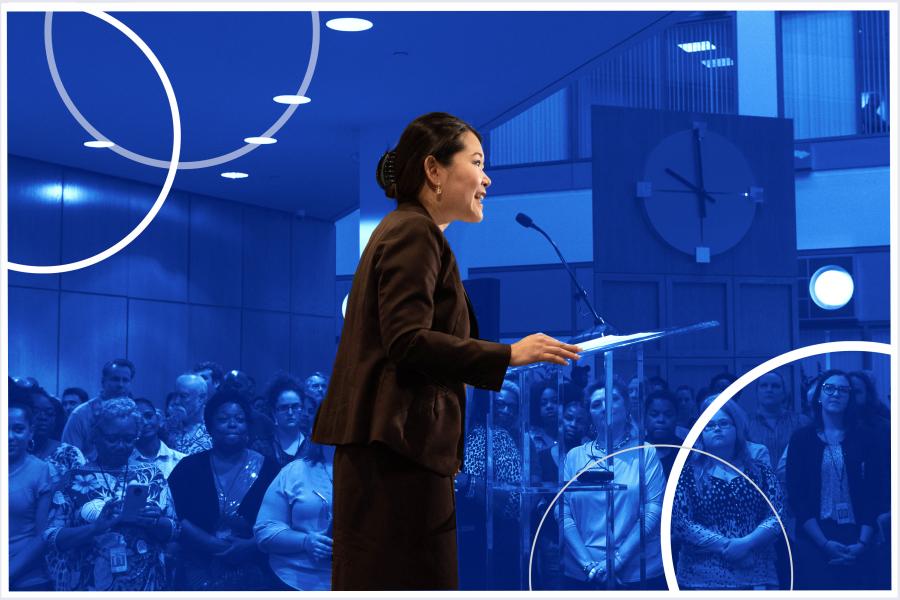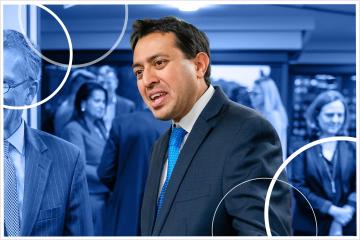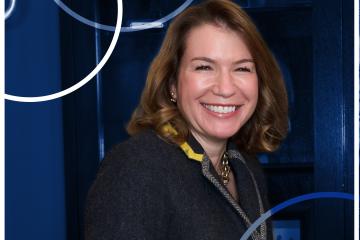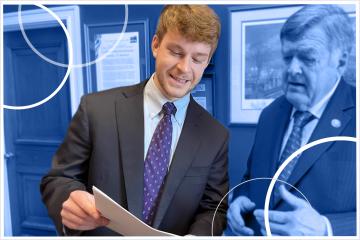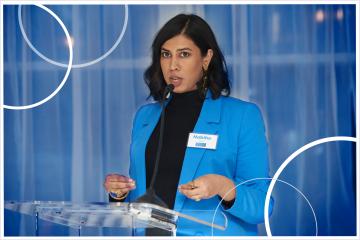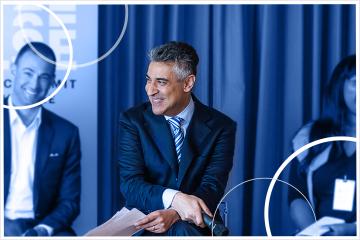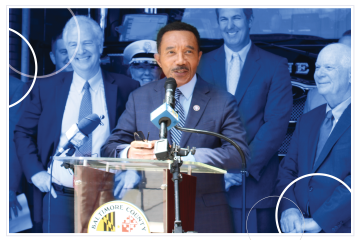The Johns Hopkins Changemakers Profile is a monthly feature spotlighting the impact of Johns Hopkins alumni in positions of influence in Washington, D.C., policymaking circles.
When Jennifer Lee completed her undergraduate studies in molecular biophysics and biochemistry at Yale University in 1998, she assumed her next career steps were obvious: complete medical school and start practicing medicine.
But a passion for policy emerged during emergency room shifts in medical school and grew during her residency at Johns Hopkins Hospital as she witnessed uninsured patients cycle in and out because they could not access proper care or medications outside the hospital.
"It just didn't make any sense to me why we would not try to address this fundamental problem," Lee said. "So, I started to ask questions."
Lee has been pursuing answers to questions about improving health care delivery ever since—as an emergency physician, a state and federal government health official, an academic and today as chief medical officer of the Alliance of Community Health Plans in Washington, D.C.
Occupation: Chief Medical Officer, Alliance of Community Health Plans (ACHP)
Age: 45
Hometown: Fairfax, Virginia
Education: Johns Hopkins University School of Medicine residency, 2003-2006; Washington University School of Medicine, 2002; Yale University, 1998
Upon graduating the Washington University School of Medicine in St. Louis, Lee said she decided not to match right away, much to the "great concern and horror" of her dentist father and gerontologist mother. Instead, as a Fairfax County, Virginia, resident, Lee decided to parlay her proximity to Washington to attain health policy experience by pursuing a position on Capitol Hill.
She received a health fellowship in the late Sen. Ted Kennedy's office, working on the Senate Committee for Health, Education, Labor, and Pensions.
"I learned a tremendous amount about the policy making process and about advocacy," she said. "But I also realized I wanted to become a doctor, to really treat patients."
She entered the match a year later and landed at Johns Hopkins Hospital for a residency from 2003 to 2006.
While Johns Hopkins is well known for medical specialties and advanced research, Lee was also pleased to experience its dedication to delivering emergency care in Baltimore for a community facing some of the most critical public health challenges of the day—opioid use disorder, HIV, hepatitis C, and gun violence.
"Hopkins was great for me because it cemented the idea that I wanted to pursue a career both in emergency medicine and health policy," Lee said.
After her residency, Lee practiced emergency medicine in Virginia while also advocating to expand access to health care at a time when the Affordable Care Act was dominating policy debates in 2010. She was awarded a health policy fellowship at George Washington University's Department of Emergency Medicine, and Virginia Gov. Tim Kaine appointed her to the state's board of medicine.
In 2011, President Obama selected her for the prestigious White House Fellows program, which assigned her to be a health adviser for the U.S. Department of Veterans Affairs. During the one-year program, she worked on various projects, including First Lady Michelle Obama's Joining Forces initiative, which rallied Americans to support wellness and employment opportunities for veterans their families.
The work led the Veterans Health Administration to start the Office of Community Engagement in its Washington, D.C., headquarters and to hire Lee as its first director.
Then, in 2012, the U.S. Supreme Court ruled that the ACA's Medicaid expansion was optional for states. Eager to help win expansion in her home state, Lee campaigned for Terry McAuliffe, the Democrat who won Virginia's governorship in 2013. Lee left the federal government to serve as McAuliffe's Deputy Secretary of Health and Human Resources.
The attempt to expand Medicaid, however, failed due to various political roadblocks.
"The only disappointment was not getting to do Medicaid expansion in that term," she said. "But everything we did set the stage for it later."
Indeed, after two years in Gov. McAuliffe's Administration, Lee returned in 2016 to the VA as deputy undersecretary for Health for Policy and Services to help correct major access-to-care issues that had arisen for veterans. At the VA, Lee oversaw clinical policy for the nation's largest integrated health system with direct oversight of 2,700 employees and a $6.6 billion budget.
A year after Donald Trump's election in 2016, however, Lee left the position.
In January 2018, she seized upon a second chance to expand Medicaid in Virginia by serving as Gov. Ralph Northam's Director of the state's Department of Medical Assistance Services, a $12 billion state agency that manages Virginia Medicaid. Six months later, the Democratic governor signed the bill into law that rendered more than 400,000 low-income Virginians eligible to receive government health insurance.
"I was very passionate about Medicaid expansion because I saw it as the policy solution to the problems with access I was seeing in the emergency department," she said. "There is no way I could have predicted my career trajectory, but I followed my passion."
Within the first nine months of the program, Lee's department enrolled 300,000 previously uninsured people—the very patients she had been angling to help for years.
"It absolutely was the most satisfying aspect of my career so far because of the impact it had on people," she said. She also established the Office of Value Based Purchasing to lead Medicaid payment reform initiatives through managed care.
"To me, it's important that we are paying for health and making sure the financial incentives are aligned with improved health," she said. "We spend so much on health care in this country, and we should get the most health out of every dollar we invest."
When the COVID-19 pandemic emerged, she left Virginia government to start a family with her husband and work as an emergency physician at George Washington University hospital.
"It was great to be part of the frontline response to COVID," she said.
She also appeared occasionally as a medical analyst on CNN to explain what hospitals were dealing with early in the pandemic. In addition, she started as a visiting scholar for the National Academy of Medicine, where she worked on policies promoting value-based payment systems.
"We needed to accelerate the transformation of the health care system to one based on value and away from the mostly fee-for-service payment system we have today," she said.
By April 2022, Lee was ready to return to a full-time position in the policy realm when the ACHP hired her as chief medical officer. The organization's mission aligned perfectly with her passion to push for that transformation.
"This has been a great opportunity for me to take what I've been studying and writing about and apply it in the private sector while also advocating for policies that support this change," she said.
Drawing on relationships on Capitol Hill and in the White House, "ACHP is elevating the voice of nonprofit, community health plans and shaping policy that builds healthy communities," states its website. The group's 24 nonprofit health providers deliver coverage and care to tens of millions across nearly 40 states and Washington, D.C., with a model that provides more incentives for better outcomes rather than rewarding more visits and procedures.
"My role is to help support our member plans meet their population health goals for their communities," Lee said. "All of our member plans have pledged to focus on improving diabetes and heart disease outcomes by measuring and addressing social drivers and to do that by the year 2030."
"We make sure the financial incentives are aligned with improved health not with seeking more reimbursement for more services," she said. "We want our system to really be a health care system, not a sick care system."
Posted in Politics+Society




